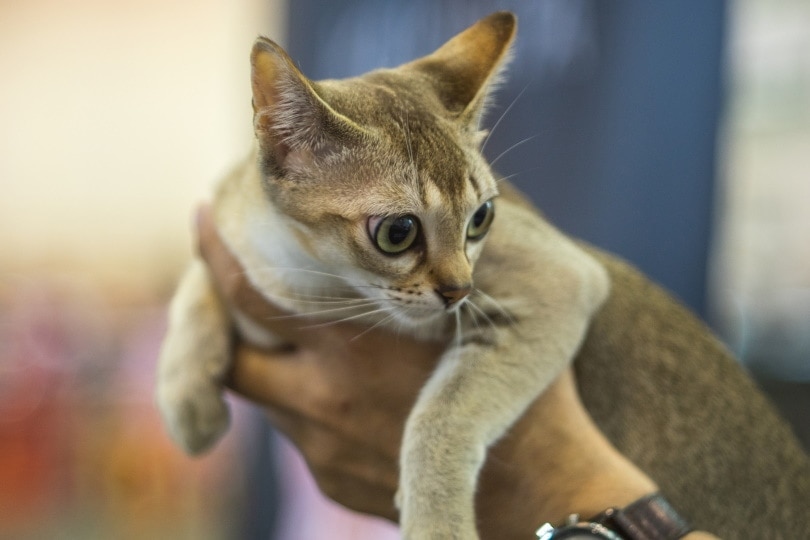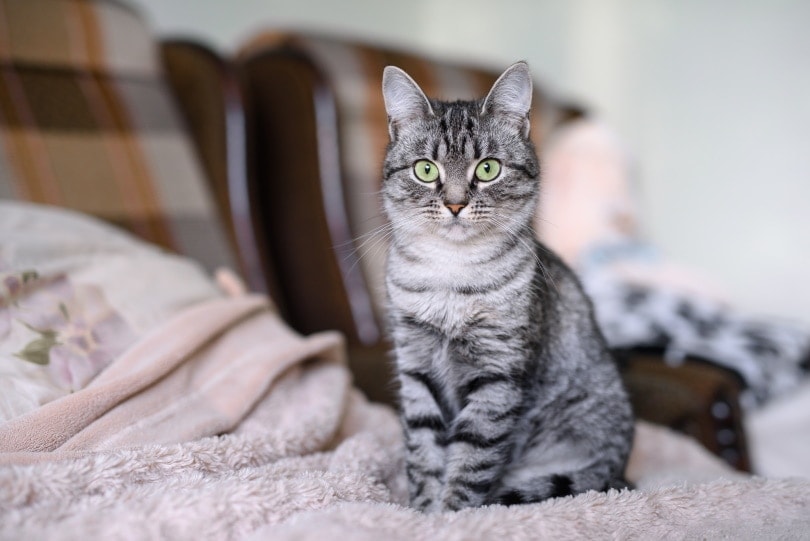Singapura Cat Breed: Info, Pictures, Care, Traits & Facts

Updated on

| Height | 6-8 inches |
| Weight | 5-9 pounds |
| Lifespan | 9-15 years |
| Colors | Brown, chocolate, sable, cream, tan, beige |
| Suitable for | Families with children, seniors, couples, singles |
| Temperament | Intelligent, easy to train, dog and kid-friendly |
If you’re in the market for a petite pussy cat, the Singapura (pronounced “sing-uh-poor-uh”) might be right up your alley! Despite being the tiniest breed of domesticated cat, the Singapura packs a lot of personality into a small package. Forever in the spotlight, the Singapura is playful, curious, loving, and easy to train. Great with kids and other pets, this friendly feline is guaranteed to quickly become your new best friend.
Thinking about adding a Singapura to your home? Here’s everything you need to know about this delightful little kitty.
Singapura Kittens
Being a relatively rare breed, a Singapura kitten from a reputable cat breeder can cost quite some money, depending on the pedigree and bloodlines. However, this hefty price tag is for the cat itself. You still need to stock up on everything your new pal will need to thrive. This includes premium cat food, a litter box, kitty litter, toys, a bed, a travel crate, a scratching post, and more. You’ll also need to be prepared to pay for your kitty’s initial shots and spaying/neutering costs.
However, many high-quality Singapura breeders will have already gotten the kitten vaccinated well before you pick them up. Just be sure to get all the vet records before you bring the cat home.
 3 Little-Known Facts About the Singapura Cat
3 Little-Known Facts About the Singapura Cat
1. They’re From Singapore
Just like their namesake implies, your Singapura kitty hails from the bustling streets of Singapore, where they’re regarded as a common cat.
2. They First Came to the United States in 1975
This micro-cat was first introduced to the United States in 1975, thanks to legendary cat breeders Tommy and Hal Meadows.
3. They’re Small!
The Singapura cat only grows to weigh about 5 to 9 pounds.

Temperament & Intelligence of the Singapura Cat
Are These Cats Good for Families? 👪
Absolutely! The Singapura cat is what you would consider a “dog-like” feline. They’re friendly, outgoing, and extremely tolerant of the kiddos. Therefore, this breed is great for families with young children, as well as first-time cat owners.
Does This Breed Get Along With Other Pets?
Yep! Thanks to their lively and laidback nature, the Singapura does well with dogs and other cats. However, it’s essential to always keep a close eye on your cat when they’re interacting with other animals and even kids. Due to their small size, they can easily get injured during rough housing.
Things to Know When Owning a Singapura Cat:

Now that you know more about your new cat’s personality, let’s dive into their care needs.
Food & Diet Requirements 
The Singapura cat does best on a high-quality cat kibble formulated for their small size and high activity level. If your cat is a grazer, leave a full food bowl out for them to eat from. If your Singapura scarfs down their meals, feed them about half a cup divided into two meals each day. Ensure they always have access to fresh, clean water.
Exercise 🐈
Despite being an active feline, it’s a smart idea to keep your Singapura kitty as an indoor-only pet. Their small size can make them an easy target for feral cats, dogs, and other dangers. Additionally, since they are an expensive breed, some people might be tempted to steal your beloved pet.
Ensure your Singapura has plenty of toys to play with to keep them entertained and active. Interactive cat toys will keep them thoroughly engaged. If your Singapura doesn’t have enough toys of their own, they’ll make their own fun by playing with your pens, keyboard, and other desktop items.
Training 🧶
The Singapura is a very smart kitty! They can easily learn basic tricks, such as fetch. Keep their mind sharp with quick, consistent training sessions and lots of challenging toys, such as cat puzzles. Positive reinforcement training techniques work best for this pet. Always reward good behavior with a high-value cat treat or catnip.
Grooming ✂️
The Singapura cat is a light shedder and doesn’t need a ton of grooming. Brush your cat bi-weekly and trim their nails as needed. Bathe your cat infrequently, as they do a great job with keeping themselves clean.
Health and Conditions 🏥
- Skin allergies
- Polycystic kidney disease
- Diabetes
- Hypothyroidism
- Renal failure
- Uterine inertia
The Singapura cat is a healthy breed and can live to be 15 years old. However, they are prone to certain health conditions as they age, including polycystic kidney disease (PKD). This is a genetic disease a cat can inherit from their parents. That’s why it’s critical to ensure genetic testing is done before bringing any Singapura kitten home.
Routine vet visits, a premium diet, and regular exercise will ensure your Singapura lives a long, happy life.
 Male vs. Female
Male vs. Female
Male Singapura cats will be a tad larger than females. There are no huge personality differences between the two genders.
Final Thoughts
If you’re on the prowl for the purr-fect pet, the Singapura cat might be a great pick for you! This pint-sized pet is great for families and singles alike. They also do well with other pets and small tots. Provide your kitty with plenty of exercise, a balanced diet, and regular wellness checks to ensure they’re healthy. In return, your Singapura will provide you with lots of love and affection for years to come!
Featured Image Credit: VictorTaurus, Shutterstock

 3 Little-Known Facts About the Singapura Cat
3 Little-Known Facts About the Singapura Cat










